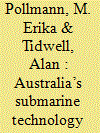|
|
|
Sort Order |
|
|
|
Items / Page
|
|
|
|
|
|
|
| Srl | Item |
| 1 |
ID:
139991


|
|
|
|
|
| Summary/Abstract |
Rebellious non-state actors of the Gaza Strip and the Sinai Peninsula have been arming themselves through smuggling networks operating in north-east Africa and the Middle East. They feature complex, dynamic, open systems which include many components of various organisational and national identities, and which are driven by various motives, united in order to accomplish the goal of arms smuggling. Previously, this system was dominated by the supply of Iranian large and high-quality weapon systems, mainly rockets, to the Palestinian Hamas, enabling them to build up military force that has sustained long-standing conflict against the stronger Israel. The Arab turmoil initiated dramatic changes in the arming system: Iran stopped, at least temporarily, the channelling of weapons to the Hamas due to its support of the Syrian opposition against the Assad regime. Egypt blocked many of Hamas's smuggling tunnels, intensifying Hamas's strategic isolation. Following the removal of Gaddafi and lack of government, Libya became a major arms source, serving mainly regional radical Islamic groups. Salafist jihadist groups in Sinai revolted against the Egyptian government, using huge local stockpiles of weapons and operational cooperation with Palestinian Islamists. This article argues that to survive, rebellious non-state actors must exploit arming opportunities in the physical, social and political environment, whereas securing shared borders is vital for defeating rebellious non-state actors. The arming of non-state actors should be analysed broadly, considering the needs of the civilian population among whom the militants are operating.
|
|
|
|
|
|
|
|
|
|
|
|
|
|
|
|
| 2 |
ID:
139989


|
|
|
|
|
| Summary/Abstract |
Australia, Japan and the USA are all facing dual pressures that require them to do more with less. Internationally, they deal with the challenge of managing China’s rapid rise. However, domestically, they must cut government spending and reduce government debt. With internal balancing effectively ruled out as a long-term solution, the three states are seeking ways to optimise external balancing, or cooperation with like-minded states. This article focuses on Australian motivations regarding the recent proposal for submarine cooperation with Japan, and places it in the context of longer trends that poise the USA, Australia and Japan for even greater trilateralism in the future. Australia’s proposal to buy submarines from Japan, should it go through, would cement Australia and Japan’s fledgling security relationship in steel and coin. For Australia, it would help it to overcome its undersea capability gap, and Japan could set a precedent to re-enter the global weapons market if all goes well. Furthermore, Australia can use defence-technology cooperation with Japan to signal to the USA the seriousness of its commitment to burden-share in pursuit of regional security and determination to politically support the USA’s ‘Pivot’ to the Asia-Pacific. However, domestic politics have begun to play an important role in Australia, with a ‘spill’ motion against Prime Minister Tony Abbott barely overcome by a backroom deal with the opposition to build the submarines domestically, and this is an important development to keep an eye on.
|
|
|
|
|
|
|
|
|
|
|
|
|
|
|
|
| 3 |
ID:
139988


|
|
|
|
|
| Summary/Abstract |
Australia was the first United Nations member state to commit to the United Nations Peacebuilding Fund when it was established in 2006, and it has made annual contributions since then. Australia has also made significant contributions towards enhancing gender equality in peace and security governance, most recently during its 2013–14 term of office on the United Nations Security Council, recognising that gender matters in and to all aspects of peacebuilding activity. This article offers a discourse-theoretical policy analysis of a range of Australian Agency for International Development guidelines and strategies addressing gender and peacebuilding issues, and reads these against the international framework to explore the discursive construction of gender-sensitive peacebuilding in Australia. The authors argue that the representations of peacebuilding in the documents they analyse shape how Australia engages in peacebuilding-related activities and inform how Australia is positioned internationally as a peacebuilding actor.
|
|
|
|
|
|
|
|
|
|
|
|
|
|
|
|
| 4 |
ID:
139990


|
|
|
|
|
| Summary/Abstract |
The main goal of this study is to look at factors determining mediation success in post-conflict environments. More specifically, the authors focus on the level of involvement of the mediator in a post-conflict setting and argue that relational mediation strategies should fare better in such environments. A most similar systems comparison of the European Union/USA and Turkish mediation efforts in Bosnia–Herzegovina, both of which started in October 2009, renders support for the authors’ argument. Their analysis of these two cases suggests that Turkey's relational mediation strategy delivered concrete outcomes in post-Dayton Bosnia compared to the structural intervention style adopted by the European Union/USA. The authors conclude that a relational mediation strategy facilitates the achievement of constructive solutions by helping third parties to make broader assessments of the conflict situation, and by offering flexible options in issue selection and process design.
|
|
|
|
|
|
|
|
|
|
|
|
|
|
|
|
|
|
|
|
|